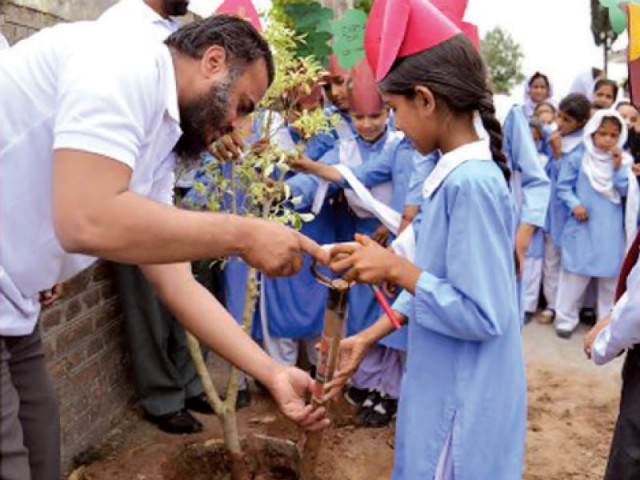Earth Day 2013: Baby steps: giving back to the environment
Students and international organisations engage in tree plantation drive.

Schoolchildren participating in the tree plantation drive at Serena Hotel on Monday. PHOTO: EXPRESS
Students, national and international organisations, the corporate sector and the diplomatic community joined hands on Monday to celebrate Earth Day in the federal capital by planting hundreds of trees and raising awareness about climate change through several activities.
More than a billion people in over 192 countries including Pakistan participated in Earth Day 2013, which is celebrated every year on April 22.
This year’s theme, “Faces of Climate Change,” shed light on both the victims of climate change and the communities who were fighting the phenomenon.
The day started with a tree plantation drive, in schools across Islamabad’s rural areas.
The plantations were conducted by Serena Hotel in collaboration with the United Nations agency for human settlements, UN-Habitat.
As part of the drive, around 350 plants were donated and planted at rural schools in Chak Shahzad, Bhara Kahu and Malpur.
A UN-Habitat Programme Officer Tauqeer Abbasi said climate change was linked to environmental degradation.
“Pakistan is one of the countries most affected by climate change. We have to rehabilitate the environment through natural resource management efforts, and trees play a vital role in such efforts,” said Abbasi.
The destructive floods in Pakistan over the past three years, which resulted in the loss of livelihoods and infrastructure, are evidence of climate change’s harmful effects in the country.
Serena Hotel’s General Manager Michel Galopin also planted a tree at one of the hotel’s gardens to mark Earth Day.
“Every one has busy lives these days. But we have to take time out for the environment because if we don’t, who will?” said Galopin.
Pakistan Institute of Medical Sciences (Pims) horticulturist Maqsood said he had helped develop the faculty garden in the institute’s compound, which boasts of at least 38 Alexandra Palm trees.
Maqsood said plants were “like the filters of nature,” because they were essential to maintaining the balance of greenhouse gases in the atmosphere.
The US ambassador to Pakistan, Richard Olson, also celebrated Earth Day by visiting around 60 Pakistani students who had gathered at the Helen Keller Centre to raise environmental awareness through art and science projects which used recycled materials.
“There is a growing consciousness that everyone has an impact on the environment. From recycling to cleaning our streams, every individual can make a difference,” said Olson.
The students, belonging to the Sir Syed Public School and the Springboard School in Rawalpindi, are also participants of the US Embassy’s English Access Microscholarship Programme, which provides English-language training for underprivileged children aged 14 to 18.
Students from the Directorate of Special Education and Social Welfare’s National Special Education Centre for the Hearing Impaired also participated in the drawing and painting activities.
The UN-Habitat has been working with 12 rural schools in the twin cities to educate students about environmental protection. In 2013, the number of schools will be increased to 34, said Abbasi.
Published in The Express Tribune, April 23rd, 2013.



















COMMENTS
Comments are moderated and generally will be posted if they are on-topic and not abusive.
For more information, please see our Comments FAQ